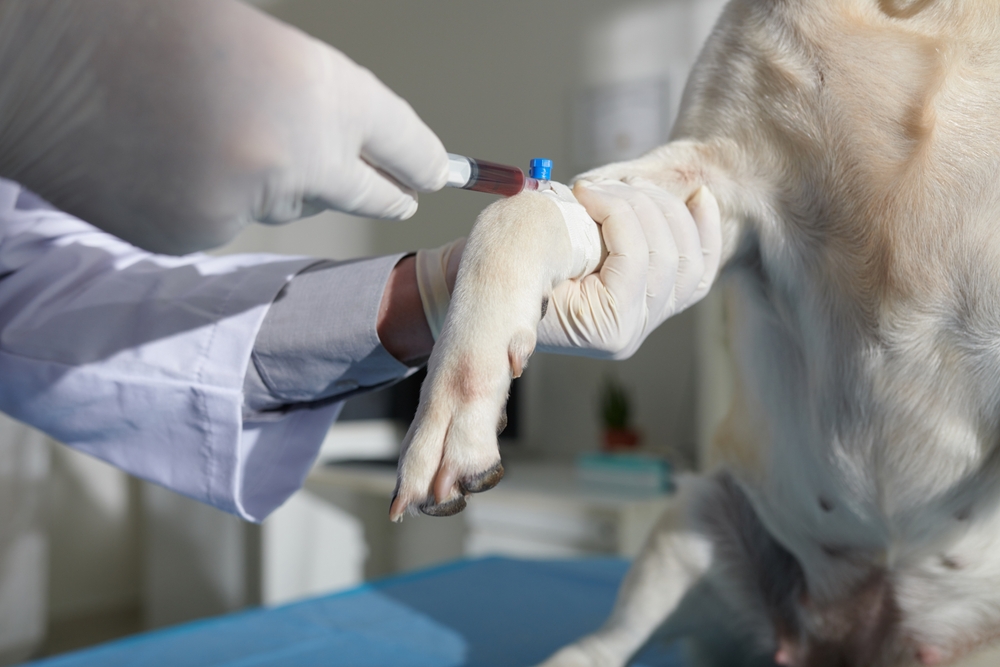Wellness from Within: Why Every Pet Needs Routine Blood Tests
At Pinedale Animal Hospital in Pinedale, Wyoming, we know pets are woven into the fabric of your family and your community. They’re your hiking partners, your confidants, and sometimes the best listener at the end of a long day. Protecting that bond means catching health concerns before they have the chance to grow.
Annual bloodwork offers a deeper look at your pet’s wellbeing, revealing early changes long before they show up on the surface. Through our Pet Annual Health Packages, routine bloodwork, unlimited exams, and preventive care are built right into a simple monthly plan. That means you never have to choose between your budget and your pet’s health. With these tools, our veterinarians can detect disease before symptoms appear, create personalized care plans, and give you peace of mind that your pet is thriving at every stage of life.
Why Annual Exams Are the Foundation of Pet Health
Regular veterinary visits are the cornerstone of prevention. Even when your pet seems perfectly fine, annual checkups allow our veterinarians to:
- Perform a nose-to-tail exam, checking weight, skin, coat, joints, and dental health.
- Review diet, activity, and lifestyle changes that may affect overall well-being.
- Discuss parasite prevention, vaccinations, and nutrition.
- Collect blood samples for routine screening to detect hidden disease.
Some conditions can only be spotted by a trained eye- like subtle heart murmurs, dental problems, or early weight changes. Others, such as kidney disease or diabetes, may not appear externally until they’re advanced. Bloodwork bridges this gap, revealing what a physical exam alone cannot.
Bloodwork Matters at Every Age
Young and Middle-Aged Pets
Even young pets benefit from screening. These panels can:
- Establish a baseline of normal values for your pet, making future changes easier to spot.
- Detect congenital conditions like liver shunts or clotting disorders.
- Monitor growth and development to ensure nutrition and organ function are on track.
- Identify early illness– even diabetes or kidney issues can appear in younger pets.
Senior Pets
As pets age, risk of disease rises. Senior panels allow early action by:
- Catching kidney or liver disease while dietary changes can still make a difference.
- Detecting thyroid conditions common in older dogs and cats.
- Screening for diabetes before dehydration or cataracts develop.
- Flagging possible cancers or immune disorders through abnormal blood cell counts.
Preventive testing for senior pets helps extend both lifespan and quality of life.
What Exactly is a Blood Panel?
Wellness panels vary by age and health status, but a typical veterinary screen evaluates major systems through several key components:
Complete Blood Count (CBC)
Measures red blood cells, white blood cells, and platelets. Abnormal values may indicate:
- Anemia from blood loss, chronic disease, auto-immune conditions, or parasites.
- Infection or inflammation that hasn’t yet caused outward signs.
- Clotting disorders if platelets are too low.
Chemistry Panel
Assesses organ function and metabolism, including:
- Kidney values (BUN, creatinine, SDMA). Even small increases can point to early chronic kidney disease in cats.
- Liver enzymes (ALT, ALP, bilirubin). Subtle elevations may appear long before jaundice or vomiting.
- Blood glucose– high values may confirm diabetes in pets.
- Electrolytes such as sodium, potassium, and calcium, which are critical for hydration, nerve function, and heart rhythm.
Thyroid Testing (T4)
The thyroid gland regulates metabolism, making this test especially important for aging pets.
- Hyperthyroidism in cats often causes weight loss despite a big appetite.
- Hypothyroidism in dogs can lead to lethargy, weight gain, and skin problems.
Heartworm Testing
Heartworm disease is widespread in the U.S. and can cause lasting heart and lung damage. Annual testing ensures:
- Prevention is working as intended.
- Infection is detected early, before symptoms appear.
- It’s safe to continue preventives.
Additional Tests When Needed
Based on your pet’s age or symptoms, our veterinarians may also recommend:
- Urinalysis to evaluate kidney concentration and urinary tract health.
- Fecal exams to check for intestinal parasites.
- Full thyroid panel for pets with borderline T4 results.
- Specialized screening such as tick-borne disease or pancreatic testing.
What Happens If We Skip the Panels?
Without annual bloodwork, hidden illness can progress unnoticed until a crisis occurs. For example:
- A middle-aged cat may not show signs of kidney disease until 70% of function is already gone.
- A senior dog with undiagnosed hypothyroidism may develop recurrent skin and ear infections, weight gain, and lethargy before being diagnosed.
- Diabetes may only be identified once pets are dangerously thin, dehydrated, or have developed cataracts.
- Cats with untreated hyperthyroidism can develop heart disease, high blood pressure, or sudden blindness.
- An undetected anemia could increase the risk of collapse during surgery or illness.
Annual blood panels mean these issues can be caught early, when treatment is more effective and less stressful for pets and owners alike.
How Wellness Plans Make Preventive Care Easier
We understand that planning for your pet’s medical needs can sometimes feel overwhelming. That’s why we created our Pet Annual Health Packages, designed to keep essential care accessible, consistent, and stress-free.
These packages bundle together the most important services- unlimited office exams, core vaccines, parasite prevention, and annual bloodwork– into a predictable monthly payment. This means no surprise bills, no tough choices about delaying care, and no gaps in your pet’s protection.
Wellness plans are a smart investment for families because they:
- Make budgeting easier – spreading costs over 12 months keeps preventive care affordable.
- Encourage proactive care – unlimited exams mean you never have to hesitate to schedule a visit if something seems “off.”
- Cover essentials automatically – vaccines, parasite prevention, and bloodwork are included, so your pet stays on track year-round.
- Protect pets at every life stage – from puppies and kittens building a foundation of health to seniors who need closer monitoring.
By enrolling in a wellness plan, you’ll have peace of mind knowing your pet’s preventive care is never overlooked. It’s one of the simplest ways to keep your four-legged family member healthier, happier, and by your side for as many years as possible.

FAQs About Annual Bloodwork
Does my pet need to fast before bloodwork?
Sometimes. Your veterinarian will advise you, especially for glucose or liver values.
Is bloodwork uncomfortable for pets?
The process is quick and gentle. Most pets hardly notice and are rewarded with treats and cuddles afterward.
Do young, healthy pets really need it?
Yes. Establishing baselines early is one of the most valuable benefits of wellness bloodwork.
Can bloodwork diagnose cancer?
Not directly, but abnormal results often provide the first clue that more testing is needed.
When will I get results?
Thanks to our in-house lab and partnership with Antech Diagnostics, most results are available the same day or within 24–48 hours.
A Lifetime of Health, One Test at a Time
Annual bloodwork is far more than a routine step- it’s a safeguard against hidden illness and a roadmap for your pet’s future. When paired with thorough physical exams and ongoing wellness care, these tests give our veterinarians the insight needed to create personalized health strategies that adapt as your pet grows and ages.
At Pinedale Animal Hospital, our goal is simple: to keep tails wagging, cats purring, and families enjoying every stage of life together. If your pet is due for their yearly screening, don’t wait until subtle changes become big problems. Contact us today to book an appointment, and explore how our Annual Health Packages make staying on top of preventive care easier than ever. Together, we’ll give your pet the healthiest, happiest life possible- inside and out.








Leave A Comment